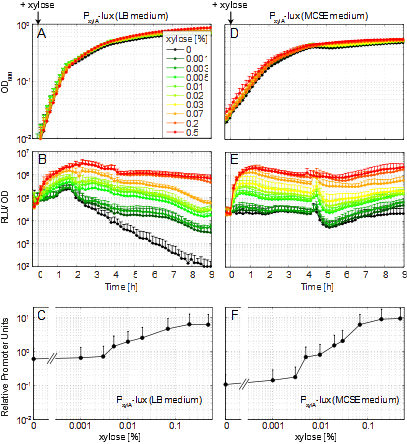Difference between revisions of "Part:BBa K1351039"
| (3 intermediate revisions by one other user not shown) | |||
| Line 11: | Line 11: | ||
| style="width: 70%;background-color: #EBFCE4;" | | | style="width: 70%;background-color: #EBFCE4;" | | ||
{| | {| | ||
| − | |[[ | + | |[[File:LMU14_PxylA-activity1.png|400px]] |
|- | |- | ||
| style="width: 70%;background-color: #EBFCE4;" | | | style="width: 70%;background-color: #EBFCE4;" | | ||
| Line 23: | Line 23: | ||
<br> | <br> | ||
| − | + | This part is used in the 2014 LMU-Munich iGEM project [http://2014.igem.org/Team:LMU-Munich BaKillus]. | |
<!-- Add more about the biology of this part here | <!-- Add more about the biology of this part here | ||
Latest revision as of 20:51, 17 October 2014
PxylA, a xylose inducible promoter for Bacillus subtilis
PxylA is the native promoter of the Bacillus subtilis xylose degradation locus xyl. The promoter is regulated by the repressor XylR which is not encoded by this BioBrick. The regulation of PxylA is only ensured, if you are working with B. subtilis as a chassis.
The BioBrick was evaluated with the integrative vector pBS3Clux, so the promoter activity was measured via luminescence output in B. subtilis.
The data (fig.1) clearly shows that PxylA can be gradually induced about 100-fold over background.
This part is used in the 2014 LMU-Munich iGEM project [http://2014.igem.org/Team:LMU-Munich BaKillus].
Sequence and Features
Assembly Compatibility:
- 10COMPATIBLE WITH RFC[10]
- 12COMPATIBLE WITH RFC[12]
- 21INCOMPATIBLE WITH RFC[21]Illegal BamHI site found at 247
- 23COMPATIBLE WITH RFC[23]
- 25COMPATIBLE WITH RFC[25]
- 1000COMPATIBLE WITH RFC[1000]

